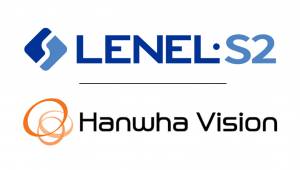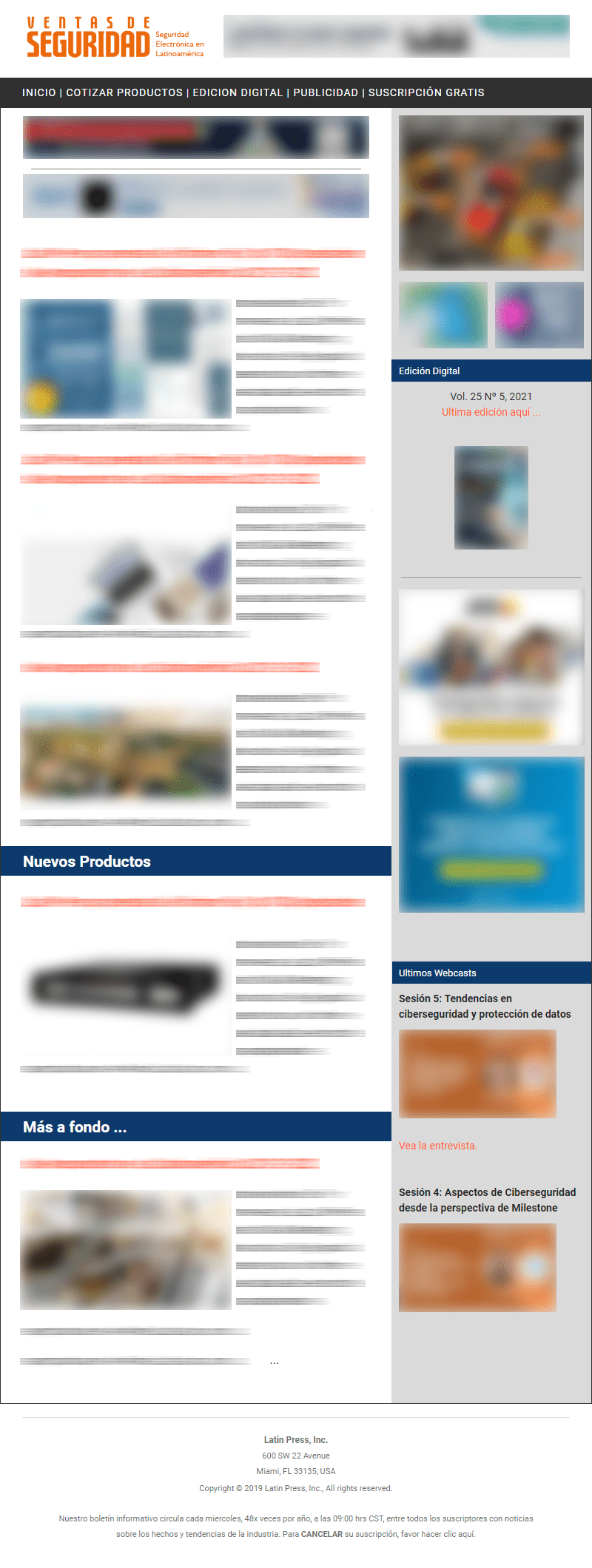The importance of using this figure will allow an electronic security project to be well installed and work efficiently.
by Eng. Germán Alexis Cortés H.*
I recently had the opportunity to accompany a friend who bought a winery in a small commercial condominium, near the city of Bogotá. I focused on the security system because those of us who work in this guild -like you or me-, observe all the corners of the new places we visit and in 10 seconds we managed to criticize the installation and improve the system in our imagination, right?
On this occasion it was clear that the system was terribly wrong. It used inadequate cable, without pipe, the assembly of cameras and sensors left much to be desired, the electromagnetic lock was not consistent with the type of door and it was easily evident that the entire system lacked energy backup. I discovered that his control center resided next to the guard's feet at the gatehouse, although what I observed was a "tangle" of messy cables, which showed in the background, a sticker with an email from the possible technical service.
I thought the cellars had been built a long time ago, but they told me they were new (I remembered that the messy cables were indeed dust-free). So why was the system so bad? Which company would be responsible for this horror? And thinking of the owner and builder of the wineries, did he really pay for all that?
You can easily think that the integrating company simply did not do a good job. Of course, it is obvious, but today I want to concentrate on the figure of the contract supervisor. The first thing I discovered was that this role had not existed in my friend's project. At least, not in a detailed and professional way. I was informed that there was a supervisor for the civil construction part, who assumed the supervision of other basic issues, but really nobody specialized, for the part of electronic safety nets.
Then, without excusing the responsibility of the integrating company, I already understood what had happened in the winery that I describe. And all this leads me to think about the GREAT importance of supervising the work of designer, integrator and installation companies.

Definition of the supervisor
In some Latin American countries, this role is also known as Auditor, Comptroller, Auditor, Inspector, Comptroller or simply Technical Supervisor. Regardless of the name assigned, the important thing is to understand that it is the professional who demands compliance with good engineering practices, verifies that the quality of all the work is the best possible and makes the project reach a successful conclusion, with the satisfaction of all parties involved.
But why are we going to fool ourselves? We are Latino, we have common genes and behaviors. Let's recognize that, in this part of the planet, unless we are forced to do something, we surely won't. It is an ethical issue, which becomes a technical one.
The work of a technical supervisor is vital for an electronic security project to be well installed and function efficiently. The guild has different opinions on this and our intention is to clarify some aspects.
The owner of the project often thinks that it is not necessary for anyone additional to control and supervise, because he trusts the company he hires to do his job well and above all to save the cost of the service.
However, it forgets that our human condition leads us to do what is strictly necessary and not what we really should do. It is my duty to inform owners and companies that buy electronic security systems, that it is better to be cautious relying on the knowledge and experience of a third party, who technically supervises and demands everything agreed. Therefore, the buyer delegates the necessary actions of supervision and control to those who know the subject and have experience, to achieve an efficient electronic system.
But also the technical supervisor represents the interests of the owner and therefore, in many cases is granted total autonomy to control, approve, direct or adjust various technical, economic, operational or even legal situations, for the benefit of the project.
Then we must understand that the presence of a technical supervisor in a project is not only to control the contractor, but also to protect the interests of the integrator when anomalies arise that are beyond their responsibility and in general to make decisions that improve the final objective of the project for the benefit of the parties involved.

Divided opinions
Some people in the electronic security guild consider that supervisors are annoying, that they do not let work, that they are "the stick in the wheel", because they do not let the project move forward; However, these are not accurate statements.
On many occasions, the technical supervisor manages to expedite the actions of the contractor, solve the problems of that integrating company and can (read: must) anticipate situations, to meet the times, costs and expected quality.
Remember that many times it is the actions of other contractors, even the owner or construction manager himself, that generate the most inconveniences to the technology integrator. The lack of detailed planning is the biggest obstacle in a real project. In most cases it is the responsibility of the owner himself or the project's management officers. The supervisor must foresee these circumstances and manage the actions, to allow the project to flow smoothly.
Registration and communication
The supervisor traditionally keeps track of everything that happens on the project. He is responsible for the minutes, log and execution of the project's communications plan. It becomes the "history book" of everything that happens. It is essential to resolve conflicts, misunderstandings and identify responsibilities of each party. He acts as secretary at any meeting (of 2 or more people) to record in a record or report the subject that was discussed, in a clear and orderly manner.
Following the methodology suggested by the PMI, the contract supervisor receives the system design and is responsible for all activities of the control phase.
Therefore, it controls the scope of the project. In its functions is to verify the object of the project contract, the quantities of equipment and installation elements. Ensure that equipment references are as promised and authorize minor changes, if any, as long as they do not adversely affect the interests of the owner.
There are continuous inconsistencies with the final quantities of ductwork, cable and accessory elements, versus those designed and quoted. The supervisor of the contract must settle these aspects and determine with evidence the quantities that were finally installed.
The technical supervisor should generate periodic and cadential reports to keep the project owner (and other interested professionals) informed of the generality of the process.
Pending everything
You must be controlling the costs of the project hand in hand with the integrator, to avoid "surprises" at the end of the contract. You must be aware of the critical path of the project and the fulfillment of the activities in the initial schedule. You must check that the human resource is the one offered and if you detect technical, procedural or legal anomalies, try to solve them in time.
You must be aware that the measured risks of the project are kept under control and/or alert the project managers of each party involved to rethink and adjust. It must demand high quality in what the integrator supplies and installs, following agreed standards and good practices of the guild.
It must demand the efficient and optimal use of the technical solution, coordinate with the group that will carry out the commissioning (exhaustive tests and fine tuning) of the entire solution and verify that the different subsystems are used correctly and their integration capabilities are used to automate most processes and prevent the system from failing continuously.

At the end of the project you will be in charge of requesting all the necessary documentation such as "as builded" plans, real connection diagrams with detailed labeling, software licenses, Operating System licenses, original manuals, first aid manuals in local language, instructions for preventive and corrective maintenance, training records, among many others.
Efficient supervisor
It must rely on commonly used tools, such as cameras, videos, audios, monitoring and control software, lists, contracts, Gantt charts, Excel tables and make use of the formal and informal means of communication that have been agreed in each project.
In such a way that you are always updated and aware of everything that happens with the work of the integrator. That you can anticipate possible failures or errors and avoid them, that you always be that helping hand that makes everything flow smoothly, as owner and contractors wait.
The technical supervisor is that professional who, when asked by the owner: "How is the project going?", does not respond with a simple "good"; but it indicates the percentage of progress at the level of time, scope and costs, indicates the inconveniences that have been overcome and proposes situations, anticipating what is coming. It generates confidence to the owner and shows that he has control of everything that happens under his responsibility.
Do not be fooled, when in a project everything works well, there are no problems and the supervisor of the contract does not excel, it is because he is indeed doing a very good job.
There are also bad supervisors who think that the more prominence they have the better and that they should always criticize something from the contractor, then they look for and look for the fault and in the end they become unwanted people by any of the parties, because they do not let the project move forward. Remember that the job of the supervisor is not to do, it is to get others to do their part.
Sometimes the projects are so large that more than one expert is required in the supervision team and then a head of Auditing is generated, with professionals in charge, who specialize in areas, subsystems or processes.
Time and costs associated with the service
Depending on the complexity of the technology project, the supervisor can be a full-time resident, that is, he goes every day, throughout the working day; part-time resident or even sporadic supervision resident.
On many occasions, with the presence on site a couple of times a week is enough to control progress, correct problems and be aware of what happened. However, it is vital to maintain fluid and constant communication with the integrating company, to solve what corresponds immediately and attend the important moments of the project.
The cost of their services will be associated with the human resources required and the availability of each professional. Traditionally, the Audit or Audit service is a percentage between 4% and 10% of the total project under its supervision. But I insist, it depends on each project.
Commissioning vs supervision
It is a mistake to expect the Commissioning service (extensive testing and fine-tuning) to be included within the monitoring service. Although the supervising professional might have the technical skills and knowledge, they typically do not have the time, tools, testing protocols, and dedication needed.
Then the value of the commissioning must be differentiated, -which depends on the number of devices to be tested and the desired level of integration-, which is traditionally a percentage between 3% and 10% of the total project to be tested. It is recommended to commission the entire system in medium and large installations, especially when there are multiple subsystems that need to be integrated and automated.
When the project has a commissioning service for the technological solution, the project supervisor usually receives the "Certificate of Conformity" as a guarantee that all the tests were satisfactorily passed, that a "fine tuning" of all the devices was made and that the systems are correctly integrated and automated, achieving the best of the installed equipment; Therefore, a final delivery certificate is made that represents the technical completion of the project.
However, remember that the project supervisor is also responsible for the liquidation and total closure of the project, including economic and legal issues.
The confusion arises when there is no specialized professional who does commissioning, then the manager of the work or the owner, expect the supervisor to receive, test and guarantee that everything purchased really works. But they do not realize that it is not the right profile and then in the eagerness to fulfill some of the responsibility, it ends up doing a general review of quantities, but it does not really do an exhaustive test of each device and settles for a very general operation of its operation; Therefore, although it "receives" the technology project, in the vast majority of cases it is not guaranteed that it will be working as expected.
Conclusion
The great conclusion is that the Supervisor, Controller or Supervisor of a technology project is an excellent figure to accompany the day to day of the project, solve problems and anticipate situations that may affect the project.
But who technically tests the purchased solution and suggests the fine adjustments, to get the most out of the technological investment is the commissioner. Both services complement and support each other, therefore both are critical for a high-tech system to work as we all expect. * Eng. Germán Alexis Cortés H. - [email protected] - [email protected]
* Eng. Germán Alexis Cortés H. - [email protected] - [email protected]
https://insetron.com/


























Leave your comment